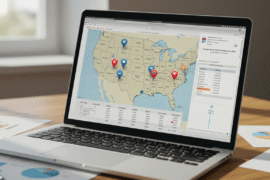This article may contain references to products or services from one or more of our advertisers or partners. We may receive compensation when you click on links to those products or services. Nonetheless, our opinions are our own.
The information presented in this article is accurate to the best of our knowledge at the time of publication. However, information is subject to change, and no guarantees are made about the continued accuracy or completeness of this content after its publication date.
Running a small business in Illinois requires planning, patience, and attention to detail, especially when it comes to taxes. From state-specific rules to overlooked deductions, tax surprises can catch business owners off guard and lead to costly penalties or missed deductions.
Fortunately, with some up-front strategy and routine oversight, you can steer clear of many common pitfalls. Keep reading to learn more about seven ways that small and midsize businesses (SMBs) in Illinois can avoid unexpected tax issues and stay ahead of the game.
- 1. Register for an Illinois EIN and Keep It Updated
- 2. Know How Your Business Type Affects Your Taxes
- 3. Set Aside Taxes Throughout the Year
- 4. Stay on Top of Sales Tax Obligations
- 5. Keep Meticulous Expense Records
- 6. Work With a Trusted Accounting Professional
- 7. Review and Adjust Your Tax Strategy Annually
- Stay Prepared and Stress-Free
- Recommended Reads
1. Register for an Illinois EIN and Keep It Updated
One of the first steps to staying compliant is becoming an Illinois registered agent with an Employer Identification Number (EIN), which serves as a unique identifier for your business, similar to a Social Security number. If you’re hiring employees, forming an LLC, or opening a business bank account, you will need to obtain an EIN. In Illinois, registering your EIN with the proper agencies also ensures you’re ready for sales tax collection and state tax reporting.
Your Illinois EIN must remain accurate as your business evolves. If your legal structure changes, you update your business name, or you move to a new location, be sure to correct this information promptly. Neglecting to do so can cause delays in processing tax forms or, worse, result in fines.
2. Know How Your Business Type Affects Your Taxes
Your legal business structure, whether sole proprietorship, partnership, LLC, or corporation, directly impacts how your income is taxed in Illinois. Each entity type comes with different obligations, including federal and state income tax filings, self-employment taxes, and payroll taxes for any employees you may hire.
If you’re unsure which structure fits your goals, this guide on how to start a small business in Illinois can help you understand the requirements for registration and taxation. Setting up your structure correctly from the beginning is crucial to avoiding unpleasant tax consequences in the future.
Some business owners find that changing their structure later can lead to more favorable tax benefits, such as electing S Corp status to reduce self-employment taxes. Working with a professional can help you determine what’s best based on your revenue and plans.
3. Set Aside Taxes Throughout the Year
One of the most common reasons for tax surprises is failing to set aside money for estimated taxes throughout the year. Unlike traditional employees, business owners typically don’t have taxes withheld from each paycheck; they’re responsible for making quarterly estimated payments to the IRS and the Illinois Department of Revenue.
Use your prior year’s income as a guide, or base your estimates on monthly profit and loss reports. Planning ahead ensures you won’t be caught scrambling when quarterly deadlines approach. It also helps avoid late payment penalties and interest charges that can accumulate quickly.
If cash flow is inconsistent, consider creating a separate savings account just for taxes. Setting aside a percentage of each payment you receive builds a cushion so you’re never caught off guard.
Voted "Best Overall Budgeting App" by Forbes and WSJ
Monarch Money helps you budget, track spending, set goals, and plan your financial future—all in one app.
Get 50% OFF your first year with code MONARCHVIP
4. Stay on Top of Sales Tax Obligations
Illinois has a complex small business sales tax system that varies depending on what you sell and where you’re located. If you sell physical goods, or in some cases, digital products, you’re likely required to collect and remit sales tax to the state. Some local jurisdictions also add their own rates, making compliance even more challenging.
Understanding your sales tax nexus (the connection between your business and the taxing state) is essential. For example, operating a physical store, having inventory in a warehouse, or selling online to Illinois customers may create a nexus. Once established, you must register for a sales tax permit and file returns on a monthly, quarterly, or annual basis, depending on your revenue.
Consider using accounting software that can track tax rates across jurisdictions and generate timely filing reminders. Automating this process can minimize the risk of filing errors and ensure compliance with Illinois’ layered tax rules.
5. Keep Meticulous Expense Records
Deductions can significantly reduce your taxable income but only if your records are accurate and thorough. From office supplies to professional services, document every eligible business expense with a receipt and properly categorize it in your accounting system.
Tracking expenses in real time prevents the year-end scramble of trying to piece together missing documentation. You can use accounting tools or mobile apps to scan receipts and log them automatically. The more detailed your records, the better your chances of claiming all allowable deductions and minimizing your tax liability.
6. Work With a Trusted Accounting Professional
Taxes are complex, especially when navigating both state and federal requirements. A licensed accountant or tax advisor can help you understand what applies to your business and assist with everything from deductions to compliance. Working with someone familiar with Illinois laws offers an extra layer of protection.
A local expert can also help you identify industry-specific tax credits or deductions that you may have missed on your own. Whether it’s startup-related costs, energy-efficiency credits, or employer incentives, these can make a real difference in your bottom line.
If you don’t have a go-to financial professional yet, now’s a great time to search for an accountant near me who understands local and state tax nuances and can offer advice tailored to your business’s size, goals, and income stream.
7. Review and Adjust Your Tax Strategy Annually
Tax laws change frequently, and your business likely evolves year to year as well. It’s essential to review your tax strategy annually to ensure it remains aligned with your financial goals and the latest tax regulations. This includes checking for new credits, adjusting your estimated payments, and evaluating your entity structure if needed.
An annual check-in also provides an opportunity to assess the effectiveness of your bookkeeping systems. This includes ensuring that all transactions are tracked in real time and verifying that payroll taxes are calculated correctly. Even minor adjustments can lead to better outcomes when it’s time to file.
Taking a proactive approach keeps you one step ahead of potential surprises. Whether you experienced growth or a downturn, updating your tax strategy ensures that your business remains both compliant and financially efficient.
Stay Prepared and Stress-Free
Tax season doesn’t have to be stressful if you stay organized and plan ahead. By understanding your Illinois tax obligations, keeping accurate records, and seeking expert guidance when needed, you can avoid surprises and keep your business running smoothly. A solid tax strategy not only helps you meet deadlines but also positions your SMB for long-term success.

Reviewed and edited by Albert Fang.
See a typo or want to suggest an edit/revision to the content? Use the contact us form to provide feedback.
At FangWallet, we value editorial integrity and open collaboration in curating quality content for readers to enjoy. Much appreciated for the assist.
Did you like our article and find it insightful? We encourage sharing the article link with family and friends to benefit as well - better yet, sharing on social media. Thank you for the support! 🍉
Article Title: 7 Ways Illinois SMBs Can Avoid Tax Surprises
https://fangwallet.com/2025/09/23/7-ways-illinois-smbs-can-avoid-tax-surprises/The FangWallet Promise
FangWallet is an editorially independent resource - founded on breaking down challenging financial concepts for anyone to understand since 2014. While we adhere to editorial integrity, note that this post may contain references to products from our partners.
The FangWallet promise is always to have your best interest in mind and be transparent and honest about the financial picture.
Become an Insider

Subscribe to get a free daily budget planner printable to help get your money on track!
Make passive money the right way. No spam.
Editorial Disclaimer: The editorial content on this page is not provided by any of the companies mentioned. The opinions expressed here are the author's alone.
The content of this website is for informational purposes only and does not represent investment advice, or an offer or solicitation to buy or sell any security, investment, or product. Investors are encouraged to do their own due diligence, and, if necessary, consult professional advising before making any investment decisions. Investing involves a high degree of risk, and financial losses may occur including the potential loss of principal.
Source Citation References:
+ Inspo
There are no additional citations or references to note for this article at this time.












































